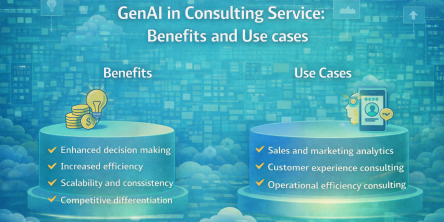Azure AI vs. AWS AI: A Comparison of Key Differences

Artificial intelligence has come a long way from being simply a futuristic concept. Today it is deemed a basic operational requirement for businesses. AI's transformative power for innovation and better customer experiences has not escaped the watchful eyes of modern businesses. No wonder then that the ability to effectively use AI has become a prerequisite for sustained growth. We must also acknowledge the role cloud computing platforms have played in democratizing AI technologies. They have empowered businesses with access to AI solutions. In this regard, Amazon Web Services and Microsoft Azure stand out as top providers. Both platforms provide a diverse set of AI tools and functionalities to meet the needs of businesses of all sizes and technical expertise. Now it goes without saying that the choice of an appropriate AI platform is an important decision for businesses. After all, it directly affects their ability to implement and scale AI initiatives.
In this blog, I will list the differences between AWS AI and Azure AI. This will help you understand if Azure AI/ML development services are better for you or if those for AWS would make a better choice.
AI in the Cloud: A Quick Download
It refers to the delivery of AI technologies and services via cloud computing platforms. The goal is to help businesses use AI capabilities albeit without needing extensive premises infrastructure. AI in the cloud democratizes AI. What I mean to say is that the cloud makes it easier and more cost effective for businesses to incorporate AI into their operations.
Azure AI vs AWS AI: Key Differences You Ought to Know
Making a decision between AWS AI and Azure AI? Both provide strong tools, but which one is best for your company will rely on its requirements. Every platform offers advantages in terms of features, cost, scalability, and integrations. We lay down the main distinctions in this guide to assist you in making a decision. Together, we can determine which AI solution best suits your objectives.
- Service offerings: AWS AI offers a highly customizable suite of ML and AI services. Amazon SageMaker is a cornerstone that provides a robust environment for developing and deploying ML models. Whereas Azure AI focuses on user friendly, pre built AI services via Azure Cognitive Services. Azure AI focuses on simplifying AI integration, particularly within the Microsoft ecosystem.
- Scalability: AWS' AI services are underpinned by Amazon SageMaker and other such offerings in its arsenal. All of them can scale automatically to handle large data volumes. Azure's global cloud also translates into ace performance in this regard. The ability to integrate Azure AI services with other Microsoft cloud offerings empower organizations to scale their AI initiatives.
- Integration: AWS AI services are intended to work seamlessly with the larger AWS ecosystem. The tech behemoth also provides a wide range of APIs and SDKs to help you integrate with third party apps. Azure's AI is also well integrated with Microsoft offerings. This tight integration makes Azure an appealing option for companies that are already heavily invested in the Microsoft ecosystem. Oh and did I mention that Azure also supports strong hybrid cloud integration?
- Pricing: AWS AI is offered with a pay as you go pricing model. So plenty of pricing options based on your usage. This flexibility enables businesses to tailor their spending to meet specific needs. Azure too offers a similar pricing model, with prices varying depending on the AI service and usage. Azure can also help you save money if you already have Microsoft enterprise agreements. And remember that it is critical to use the pricing calculators for both AWS and Azure to determine the most cost effective platform for your specific use case.
- Industry adoption: AWS serves a large customer base, with widespread adoption across multiple industries. Its flexibility and scalability make it especially popular among startups and organizations that need highly customizable AI solutions. Azure has also seen widespread adoption in enterprise environment. Azure is also gaining traction in industries such as healthcare and finance.
Final Words
AI on cloud is now essential for companies trying to stay innovative and competitive, not just a luxury. Powerful features are offered by both AWS AI and Azure AI; nevertheless, which option is best for your company will rely on its unique requirements, financial constraints, and current technology stack. It's critical to comprehend the distinctions between cost-effectiveness, integration, and scalability. Through educated decision-making, companies may fully utilize AI's potential to spur expansion, improve productivity, and develop more intelligent products. Based on the differences between the two offerings, you will be able to see if Azure AI/ML development or AWS AI is better suited for your organization.
Similar Articles
Here's the reality: your hiring team is buried under mountains of applications. Meanwhile, finding genuinely qualified talent? That's gotten harder, not easier.
Here's a frustrating reality: your construction company can't sit around waiting months for payments, but that's precisely what's happening right now.
The modern, fast-paced digital economy has flipped customer expectations from businesses with which they engage. Think about it; customers now want immediate, 24-hour support.
The rapid advancement of generative artificial intelligence has had a massive impact on technology as well as the market. What I mean is that Gen AI has transitioned from a novelty to a core business priority.
Have you observed that while some websites are hardly cited in AI-powered search outcomes, others emerge more frequently?
The goal of AI is to enable businesses to operate more efficiently, develop better products, and support QA teams in completing their tasks more effectively.
Bring still images to life with make a photo talk AI tools. Learn how to create a natural AI talking avatar using Media.io's powerful audio-video models and templates.
AI agents are no longer an experiment in financial institutions. They are becoming the operational engine that powers real time decisioning, proactive fraud defense, precise risk scoring, and automated compliance workflows.
Banks are facing a moment of truth. Customer expectations are rising faster than most institutions can reshape their operating models.









